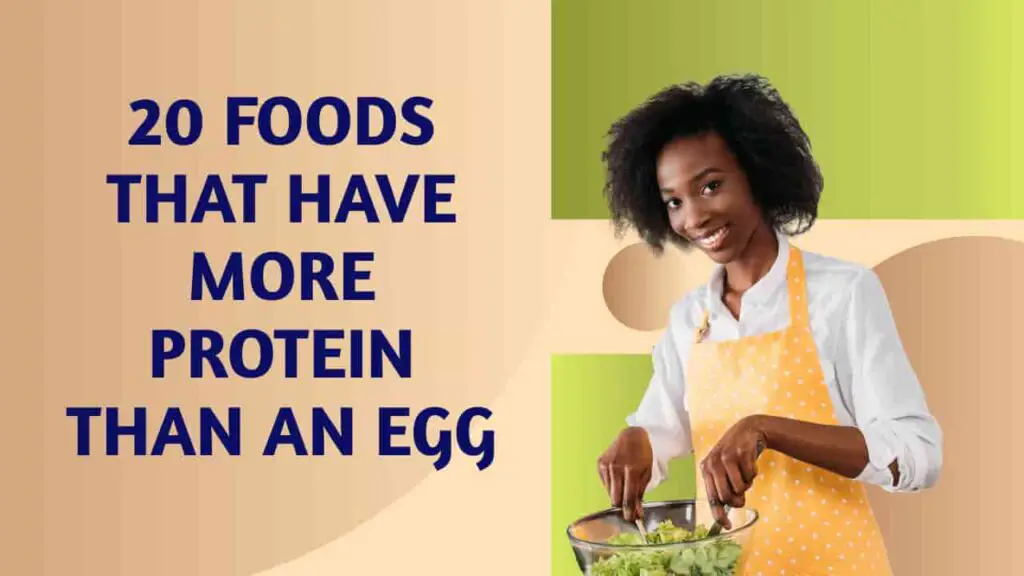Are you looking to increase your protein intake without eggs? Check out these 20 foods that have more protein than an egg.
If you’re looking to increase your protein intake, there are plenty of options out there besides eggs. While eggs are a great source of protein, they aren’t the only option. In fact, there are many other foods that have more protein than an egg. In this article, we’ll explore 20 of these protein-rich foods.

-
Save
Table of Contents
20 Foods That Have More Protein than an Egg
Protein is an essential nutrient that is necessary for many of the body’s functions. It is especially important for building and repairing muscle tissue. While many people think of eggs as a great source of protein, there are many other foods out there that have more protein than an egg.
- Why is protein important?
Protein is an important nutrient that helps to build and repair tissues in the body. It is also involved in many of the body’s processes, such as the production of hormones and enzymes. Protein is especially important for athletes and people who are trying to build muscle mass.
- How much protein do you need?
The amount of protein you need depends on a variety of factors, such as your age, gender, weight, and activity level. However, a general guideline is to consume around 0.8 grams of protein per kilogram of body weight. This means that a person who weighs 70 kilograms should aim to consume around 56 grams of protein per day.
List of Foods with more protein than an egg
Here are 20 foods that have more protein than an egg:
01. Tuna: Tuna is a great source of protein, with around 26 grams of protein per 100 grams of tuna. It is also low in fat, making it a great option for people who are trying to lose weight. This is the best food which falls under the list of foods that have more protein than an egg.
02. Greek yogurt: Greek yogurt is another great source of protein, with around 10 grams of protein per 100 grams of yogurt. It is also high in calcium and probiotics, which can help to improve gut health.
03. Lentils: Lentils are a great vegetarian source of protein, with around 9 grams of protein per half cup of cooked lentils. They are also high in fiber, which can help to promote feelings of fullness.
04. Turkey breast: Turkey breast is a lean source of protein, with around 24 grams of protein per 100 grams of turkey. It is also low in fat, making it a great option for people who are trying to lose weight. This is also one of the best food which falls under the list of foods that have more protein than an egg.
05. Quinoa: Quinoa is a great gluten-free source of protein, with around 4 grams of protein per half cup of cooked quinoa. It is also high in fiber and minerals, such as magnesium and phosphorus.
You can also read: Food safety for handling frozen foods
06. Cottage cheese: Cottage cheese is a great low-fat source of protein, with around 11 grams of protein per 100 grams of cottage cheese. It is also high in calcium, which can help to improve bone health.
07. Pumpkin seeds: Pumpkin seeds are a great vegetarian source of protein, with around 19 grams of protein per 100 grams of pumpkin seeds
08. Edamame: Edamame is a great plant-based source of protein, with around 11 grams of protein per half cup of cooked edamame. It is also high in fiber and antioxidants, which can help to improve heart health.
09. Almonds: Almonds are a great source of protein, with around 6 grams of protein per 30 grams of almonds. They are also high in healthy fats and fiber, which can help to improve cholesterol levels.
10. Bison: Bison is a lean source of protein, with around 25 grams of protein per 100 grams of bison. It is also lower in fat than beef, making it a healthier option.
11. Chickpeas: Chickpeas are a great vegetarian source of protein, with around 7 grams of protein per half cup of cooked chickpeas. They are also high in fiber and minerals, such as iron and potassium.
12. Peanut butter: Peanut butter is a great source of protein, with around 8 grams of protein per 2 tablespoons of peanut butter. It is also high in healthy fats and fiber, which can help to improve heart health.
13. Pork chops: Pork chops are a lean source of protein, with around 26 grams of protein per 100 grams of pork chops. They are also high in vitamin B12 and zinc, which can help to improve immune function.
14. Milk: Milk is a great source of protein, with around 8 grams of protein per cup of milk. It is also high in calcium and vitamin D, which can help to improve bone health.
15. Black beans: Black beans are a great vegetarian source of protein, with around 7 grams of protein per half cup of cooked black beans. They are also high in fiber and antioxidants, which can help to improve heart health.
16. Beef jerky: Beef jerky is a convenient and portable source of protein, with around 20 grams of protein per 30 grams of beef jerky. However, it can also be high in sodium, so it’s important to choose a low-sodium option.
17. Chia seeds: Chia seeds are a great vegetarian source of protein, with around 4 grams of protein per 2 tablespoons of chia seeds. They are also high in fiber and omega-3 fatty acids, which can help to improve heart health.
18. Hemp seeds: Hemp seeds are another great vegetarian source of protein, with around 10 grams of protein per 30 grams of hemp seeds. They are also high in healthy fats and minerals, such as iron and magnesium.
19. Tofu: Tofu is a great vegetarian source of protein, with around 10 grams of protein per half cup of tofu. It is also high in calcium and iron, which can help to improve bone and blood health.
20. Salmon: Salmon is a great source of protein, with around 25 grams of protein per 100 grams of salmon. It is also high in omega-3 fatty acids, which can help to improve heart health.
Conclusion
While eggs are a great source of protein, there are many other options out there that have even more protein. Incorporating these protein-rich foods into your diet can help to improve muscle mass, bone health, and overall health. Anyways, keep it mind to do exercise regularly along with protein intake and don’t forget to travel to freshen your mind soul and mind.
FAQs
It depends on a variety of factors, such as your age, gender, weight, and activity level. However, a general guideline is to consume around 0.8 grams of protein per kilogram of body weight.
Yes, there are several vegetarian sources of protein on this list, including lentils, chickpeas, edamame, black beans, chia seeds, hemp seeds, and tofu.
Yes, it is possible to get enough protein from a plant-based diet as long as you consume a variety of protein-rich foods throughout the day.
Protein can help with weight loss by increasing feelings of fullness and reducing appetite. It also requires more energy to digest, which can boost metabolism.
Consuming too much protein can put strain on the kidneys and lead to dehydration. It is important to consume protein in moderation and to balance it with other macronutrients.
-
Save
ThatGratefulSoul
- ThatGratefulSoul
- March 22, 2023
- 12:47 pm
- No Comments

